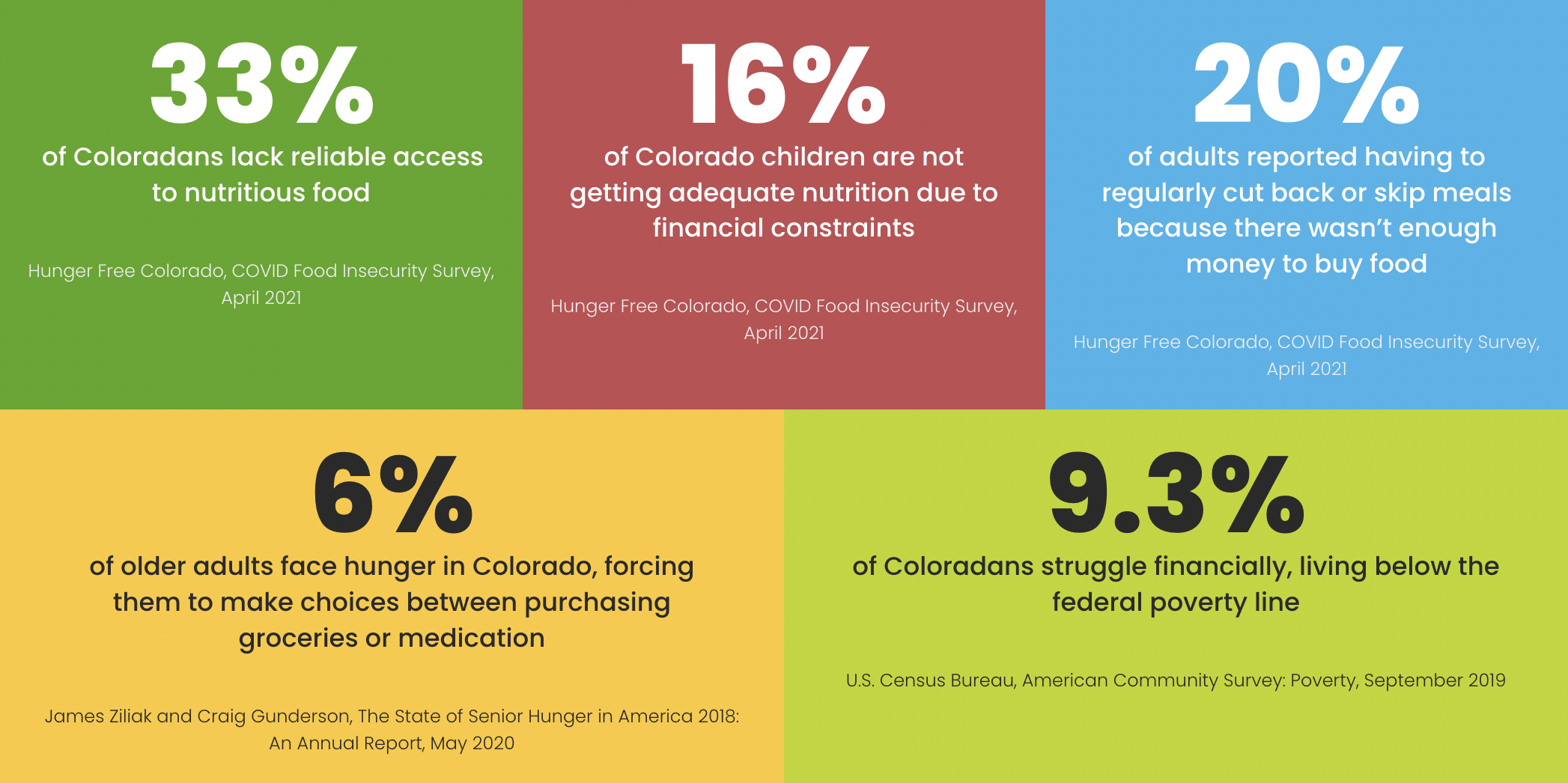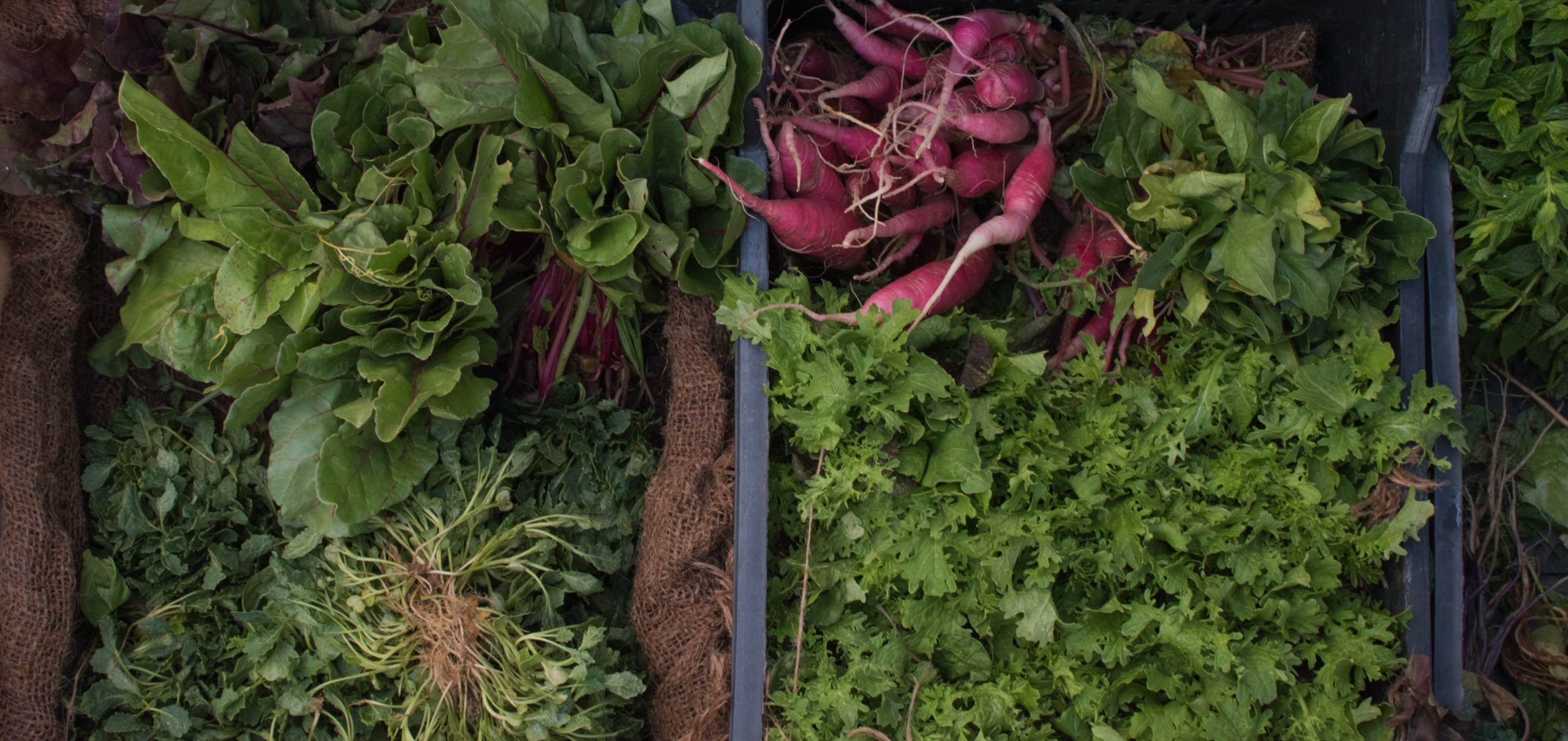With 33% of Colorado residents facing food insecurity – defined as eating less than they felt they should in the past year because there was not enough money for food – we want to highlight the resources available to help fight hunger in our communities. Whether you are in need of assistance in obtaining healthy food or you want to support an organization working for food justice, the organizations listed below are vital resources for Colorado residents.

Graphic from Hunger Free Colorado
Auraria Campus Resources for Students
Metropolitan State University of Denver
The Rowdy’s Corner (formerly the Roadrunner Food Pantry) serves to fight hunger on campus by providing a variety of food and snack options for all MSU Denver students. https://www.msudenver.edu/student-care-center/rowdys-corner/
Community College of Denver
The Community College of Denver, in partnership with Foodbank of the Rockies (FBR) Mobile Food Pantry, distributes pre-made grocery boxes twice a month for all Cityhawks, whether students, faculty, or staff. They also have two in-person food pantries: one on Auraria Campus and one at the Lowry Campus.
University of Colorado Denver
CU Denver students have access to free food and hygiene products at the Lynx Food Pantry. www.ucdenver.edu/wellness/services/basic-needs/food-assistance/food-pantry
Denver Metro and Colorado Community Resources
Find a Food Pantry near you at https://www.foodpantries.org/ or in the state of Colorado at: https://www.foodpantries.org/st/colorado
Located at 1212 Mariposa, the Denver Inner City Parish (DICP) serves the La Alma/Lincoln Park neighborhood that surrounds CVA. Food programs at DICP include a Saturday food pantry, a new mobile food pantry operating several times per week, and nutrition classes.
Denver Community Fridge is a mutual aid project aimed at combatting food insecurity and reducing food waste in the Denver Metro area. The fridges are free for anyone to use, anytime. Community fridge map – https://denvercommunityfridges.com/locations/
Metro Caring is a local food pantry that supplies anyone in need with food resources, including fresh produce and a variety of non-perishable items. Metro Caring is centrally located at the intersection of E. 18th Avenue and Downing Street and is along two major bus routes: #12 and #20. Appointments are required. Call (303) 860-7200 to make an appointment to get assistance from Metro Caring.
We Don’t Waste works to reduce hunger and food waste in the Denver area by recovering quality, unused food from the food industry and delivering it to nonprofit partners. In addition, We Don’t Waste developed a Mobile Food Market initiative to reach further into the community, serving people with healthy, nutritious food. Their markets are open to everyone, no matter what your circumstances are.
The GrowHaus is a nonprofit indoor farm in north Denver dedicated to food production, food education, food distribution, and economic opportunity. Located in the Globeville and Elyria-Swansea neighborhoods where there are no grocery stores, GrowHaus collaborates with community members on food production, access, and education, reconnecting them to healthy foods.
Food Bank of the Rockies maintains a database of Food Pantries and related food assistance programs throughout the state. Simply click on your location and find local food pantries and programs that may meet your needs.
Hunger Free Colorado also offers a variety of food-related resources. Their Food Resource Hotline is a one-stop resource for food and nutrition information in Colorado. It is a multilingual resource designed to assist in locating both public and private food assistance programs. All information is kept confidential and services are available in 150+ languages. They also maintain an updated list of local community food pantries and K-12 school-based meal programs. Call the Food Resource Hotline at 855-855-4626.
You can connect with 2-1-1 (web-based resources, virtual live chat, or dial 2-1-1 by phone) for additional food resources in your home county.
Additional Links
Spirit of the Sun – www.spiritofthesun.org
Project Angel Heart – www.projectangelheart.org
Denver Food Rescue – denverfoodrescue.org
City Harvest – www.cityharvest.org
East Denver Food Hub – www.eastdenverfoodhub.com
Bienvenidos Food Bank – www.bienvenidosfoodbank.org
Jewish Family Service – www.jewishfamilyservice.org
Heart & Hand – www.heartandhandcenter.org
The Gathering Place – tgpdenver.org
Farm to Child – cdphe.colorado.gov/child-and-adult-care-food-program-cacfp/farm-to-child
So All May Eat (SAME Cafe) – soallmayeat.org
Denver Urban Gardens – dug.org
Go Farm – www.gofarm.org
Cafe 180 – www.cafe180.org
Colorado Department of Human Services – https://cdhs.colorado.gov/

